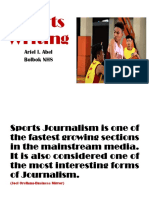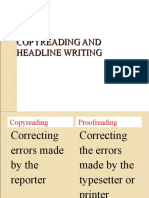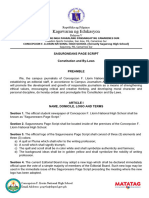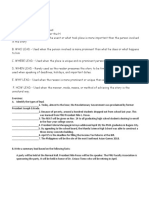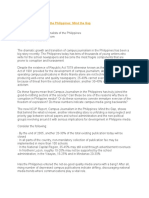This Dress Code Stinks
This Dress Code Stinks
Uploaded by
api-450081792Copyright:
Available Formats
This Dress Code Stinks
This Dress Code Stinks
Uploaded by
api-450081792Original Title
Copyright
Available Formats
Share this document
Did you find this document useful?
Is this content inappropriate?
Copyright:
Available Formats
This Dress Code Stinks
This Dress Code Stinks
Uploaded by
api-450081792Copyright:
Available Formats
This Dress Code Stinks!
The staff of the Pleasantville High Reporter would like to take a stand against what we believe is
a draconian, free-speech-stifling measure: our new dress code, which was approved at the
latest PTA meeting.
We are almost adults, and we should be treated as such. This is an issue of respect, and the
student body wishes we had been given a chance to speak for ourselves prior to this decision
being made. The fact that we weren’t consulted at all says a lot about the administration’s
opinion of its students, not to mention the parents’. If students were to get together and decide
that our parents couldn’t wear blue jeans, there would be a huge fight. With the roles reversed,
we have little recourse. It’s very frustrating.
Were shirts with writing on them ever an issue to begin with? Outside of a few isolated incidents
in school records, the latest of which occurred a little under a decade ago, we can’t find proof at
all that says they were.
In fact, the only paperwork we could find said the school is selling garments from a specific
maker—Pleasantville Wordless Shirts—at a pretty good markup. The school doesn’t force us to
wear the shirts or anything, but they push them on us quite a bit as good alternatives…and that
makes this columnist wonder.
The administration has been little help in our quest to get this all figured out. In fact, our editor
requested to talk to the principal about it so many times he threatened punishment if she
brought it up again. This is hardly a professional response to a disagreement, a pattern we’ve
noticed in almost all instances related to this new dress code. If anything, our administrators
came out swinging, taking the defensive before we even really complained.
Why is this all so important? There are a few reasons. The first is that, as people with free
speech rights, we want to wear whatever we want, provided it’s appropriate to display at school.
Certainly nobody wearing a shirt with curse words all over it should be allowed in, but simple
branding or logos with words? Banning those altogether is a bullheaded move.
Secondly, and maybe more importantly, we want an open dialogue when any decision regarding
our personal expression is made. This is only fair. It’s something people have fought for—and
with good reason. Rules shouldn’t be made for rules’ sake (or, as we suspect, for selling shirts’
sake).
We’d love to talk this out. If anyone capable of making an overturn decision wishes to hear our
case, we’ll send delegates. Even if nothing changes, perhaps someone can offer us an
explanation. In this situation, it’s hardly too much to ask for. We wonder why we should even
have to ask at all.
You might also like
- LA1040 - VLE Contract LawDocument286 pagesLA1040 - VLE Contract LawHasnat AslamNo ratings yet
- Sports Writing Individual CategoryDocument31 pagesSports Writing Individual CategoryJENNIFER LUMBRESNo ratings yet
- Headline Counting HandoutDocument3 pagesHeadline Counting HandoutTin TinNo ratings yet
- Gratuitous BailmentDocument5 pagesGratuitous Bailmentin1orNo ratings yet
- RR 10-08Document30 pagesRR 10-08matinikki100% (1)
- University Hospitals Court Filing Response To Fertility Failure ComplaintDocument27 pagesUniversity Hospitals Court Filing Response To Fertility Failure ComplaintWKYC.comNo ratings yet
- Rule 39 - ExecutionDocument59 pagesRule 39 - Executionmaria luz100% (1)
- Copyreading and Headline Writing Exercise01Document2 pagesCopyreading and Headline Writing Exercise01pheonixmtbtNo ratings yet
- Column Power Pt.Document25 pagesColumn Power Pt.Marife Abbang FerrerNo ratings yet
- Editorial and Column Handout (Eng & Fil)Document13 pagesEditorial and Column Handout (Eng & Fil)Dragonite100% (1)
- Editorial Writing LectureDocument50 pagesEditorial Writing LectureJennifer Lopez100% (1)
- Copy Reading and Headline WritingDocument19 pagesCopy Reading and Headline WritingEarl Vincent VistaNo ratings yet
- CopyreadingDocument4 pagesCopyreadingEmon MijasNo ratings yet
- Copyreading and Headline Writing 1Document53 pagesCopyreading and Headline Writing 1perlishell7495% (22)
- ### Editorial - Writing by Ate PDFDocument63 pages### Editorial - Writing by Ate PDFMei XingNo ratings yet
- CRHW eDocument9 pagesCRHW eAnn Therese JordanNo ratings yet
- Filipino English FeatureDocument6 pagesFilipino English FeatureShyyyyyyNo ratings yet
- VOLLEYBALLDocument4 pagesVOLLEYBALLCATHERINE MAE BALAYO-BUDONo ratings yet
- Copyreading and Headline WritingDocument105 pagesCopyreading and Headline Writingpingolbelinda15No ratings yet
- Criteria For SPA and CJDocument3 pagesCriteria For SPA and CJRhea Somollo BolatinNo ratings yet
- Sample Column ArticlesDocument7 pagesSample Column ArticlesGlenda B. RamosNo ratings yet
- DIRECTIONS: Read The Following Article Carefully, Then Copyedit Using Appropriate CopyreadingDocument2 pagesDIRECTIONS: Read The Following Article Carefully, Then Copyedit Using Appropriate CopyreadingNymfa Balubar Gaco100% (2)
- Sports Writing PromptsDocument6 pagesSports Writing PromptsKylaJolampongNo ratings yet
- Editorial-Cartooning VillaceranDocument41 pagesEditorial-Cartooning VillaceranJanix MagbanuaNo ratings yet
- CHRW 2024Document6 pagesCHRW 2024napjenard0614No ratings yet
- Feature Writing Edited JedDocument28 pagesFeature Writing Edited JedStephanieNo ratings yet
- Copy ReadingDocument1 pageCopy ReadingKiray EscarezNo ratings yet
- Collaborative Desktop PublishingDocument33 pagesCollaborative Desktop PublishingMark James VallejosNo ratings yet
- Column Writing. AvrDocument20 pagesColumn Writing. AvrLance Fabre100% (1)
- SPJ LAS Q2 Week 1 To 5Document67 pagesSPJ LAS Q2 Week 1 To 5Lovilyn EncarnacionNo ratings yet
- Constitution and Bylaws JounalismDocument16 pagesConstitution and Bylaws JounalismRhoda Fe SalenNo ratings yet
- LAS SPJ7 q1Document45 pagesLAS SPJ7 q1delacruzkatelhaynielNo ratings yet
- Collaborative Desktop PublishingDocument6 pagesCollaborative Desktop PublishingRedj Zyrylle Garcia SaysonNo ratings yet
- Pagsulat NG EditoryalDocument20 pagesPagsulat NG EditoryalAngel Grace CincoNo ratings yet
- The Nuts and Bolts of Feature WritingDocument5 pagesThe Nuts and Bolts of Feature WritingЛеиа АморесNo ratings yet
- Copyreading and Headline Writing Elementary: Code Final Score RankDocument2 pagesCopyreading and Headline Writing Elementary: Code Final Score RankReggieReyFajardoNo ratings yet
- Editorial Writing TipsDocument2 pagesEditorial Writing TipsMhicko SantiagoNo ratings yet
- ENGLISHDocument3 pagesENGLISHapril delos santos100% (1)
- Editorial CartooningDocument34 pagesEditorial CartooningSherlyn Manzano UrbanNo ratings yet
- Science and Health WritingDocument51 pagesScience and Health WritingVera Mae Rigor100% (2)
- Editoryal Tungkol Sa HazingDocument2 pagesEditoryal Tungkol Sa HazingThelma Ruiz SacsacNo ratings yet
- Feature WritingDocument3 pagesFeature WritingB.j. Reyes Ü100% (1)
- How To Win in Sports WritingDocument21 pagesHow To Win in Sports WritingRhandee GarlitosNo ratings yet
- Editorial WritingDocument7 pagesEditorial WritingRuqaiyaNo ratings yet
- Editorial Writing LNHSDocument56 pagesEditorial Writing LNHSJulieta Granada AsuncionNo ratings yet
- Duterte: I'm Not Interested in Going Beyond My TermDocument3 pagesDuterte: I'm Not Interested in Going Beyond My TermMarjorie Delrosario PilonNo ratings yet
- CRHW 2024 1Document12 pagesCRHW 2024 1Daisy Anne CunananNo ratings yet
- Newest Editorial Writing 2018Document29 pagesNewest Editorial Writing 2018Jane Baligod RapadasNo ratings yet
- Session 1: Early Language Literacy and Numeracy: Pre-TestDocument40 pagesSession 1: Early Language Literacy and Numeracy: Pre-TestGly Pascual Asuncion100% (1)
- News WritingDocument23 pagesNews WritingJonell GregorioNo ratings yet
- Science Journalism Workshop 1Document28 pagesScience Journalism Workshop 1Mariel EfrenNo ratings yet
- Headline Writing 2018-2019Document35 pagesHeadline Writing 2018-2019Fe Evangeline Sapon100% (1)
- Column Writing in JournalismDocument7 pagesColumn Writing in JournalismFlorence Villaruel - MandigmaNo ratings yet
- Science and Technology WritingDocument14 pagesScience and Technology WritingMary Ann AysonNo ratings yet
- Excuse Letter For DSSPCDocument13 pagesExcuse Letter For DSSPCWenalyn DacutNo ratings yet
- 2016 School Based Seminar-Workshop: WinterDocument53 pages2016 School Based Seminar-Workshop: WinterRansel Burgos100% (1)
- Feature WritingDocument2 pagesFeature WritingJoenabeth MorbosNo ratings yet
- Savory Camp Parent's PermitDocument1 pageSavory Camp Parent's PermitJoseph Ferreras-Guardian Eva-EscoberNo ratings yet
- News Writing Lead WritingDocument1 pageNews Writing Lead WritingGlaiden MaryNo ratings yet
- Copyreading and Headline Writing HandoutDocument1 pageCopyreading and Headline Writing HandoutRAIZA YBAÑEZNo ratings yet
- JOURNALISM MODULE 3 (Official)Document15 pagesJOURNALISM MODULE 3 (Official)Roselyn PogoyNo ratings yet
- Campus Journalism ModuleDocument28 pagesCampus Journalism ModuleRachelle Gonzales100% (1)
- MANILA - Copy Reading and Headline WritingDocument3 pagesMANILA - Copy Reading and Headline WritingPrecious Jemaima OlanNo ratings yet
- BockettDocument94 pagesBockettnaditaloyolitaNo ratings yet
- School Dress Codes ThesisDocument5 pagesSchool Dress Codes Thesisafcnoxdhv100% (2)
- Law of ContractDocument17 pagesLaw of ContractMarium RazaNo ratings yet
- Referencing Using OSCOLADocument4 pagesReferencing Using OSCOLAChristianNo ratings yet
- PB Teori 3: Program'S Code & NameDocument3 pagesPB Teori 3: Program'S Code & NameKhairul Bariyah Bt NokmanNo ratings yet
- Shabrimala Case Moot Court Memorial FileDocument37 pagesShabrimala Case Moot Court Memorial FileShubhankar BagadNo ratings yet
- United States v. Novia Turkette, JR., United States of America v. John Vargas, 632 F.2d 896, 1st Cir. (1980)Document22 pagesUnited States v. Novia Turkette, JR., United States of America v. John Vargas, 632 F.2d 896, 1st Cir. (1980)Scribd Government DocsNo ratings yet
- User Manual: Rs 20 E - Rs 24 E - Rs 30 EDocument4 pagesUser Manual: Rs 20 E - Rs 24 E - Rs 30 EValy-TGVNo ratings yet
- Act 696 - Witness Protection Act 2009Document27 pagesAct 696 - Witness Protection Act 2009Taufik AwaludinNo ratings yet
- LIBERI V TAITZ (C.D. CA) - 333.2 - 2 Memorandum of Points and Authorities - Gov - Uscourts.cacd.497989.333.2Document25 pagesLIBERI V TAITZ (C.D. CA) - 333.2 - 2 Memorandum of Points and Authorities - Gov - Uscourts.cacd.497989.333.2Jack RyanNo ratings yet
- (Digest) Wainright V VersozaDocument2 pages(Digest) Wainright V VersozaKarla BeeNo ratings yet
- Bailment As An Equitable PrincipleDocument17 pagesBailment As An Equitable PrincipleAnkit JindalNo ratings yet
- As Civil Suit To Enforce Claim in Benami Property Is Barred, Criminal Proceeding by 'Real' Owner Also Impermissible - Supreme CourtDocument5 pagesAs Civil Suit To Enforce Claim in Benami Property Is Barred, Criminal Proceeding by 'Real' Owner Also Impermissible - Supreme CourtPrasad VaidyaNo ratings yet
- Old Companies Ordinance Cap 32 PDFDocument392 pagesOld Companies Ordinance Cap 32 PDFSinoNo ratings yet
- Ims Unison University 5Th National Moot Court Competition, 2017Document43 pagesIms Unison University 5Th National Moot Court Competition, 2017Swastik GroverNo ratings yet
- Constitution of IndiaDocument2 pagesConstitution of IndiaSuzie ZhiangNo ratings yet
- Criminal Law and Procedure Chapter 10Document3 pagesCriminal Law and Procedure Chapter 10Daniel LyndsNo ratings yet
- Ramirez Vs BaltazarDocument4 pagesRamirez Vs BaltazarAaliyah AndreaNo ratings yet
- Del Mar v. Pagcor (Digest)Document2 pagesDel Mar v. Pagcor (Digest)Kris Mercado0% (3)
- 15 ZIE and ECZDocument22 pages15 ZIE and ECZPhenias ManyashaNo ratings yet
- Category Amount in Rs. Short or Long Stay Visitor Visa Rs. 5,400 VFS Service Charge Rs. 532 (Inclusive of All TaxDocument17 pagesCategory Amount in Rs. Short or Long Stay Visitor Visa Rs. 5,400 VFS Service Charge Rs. 532 (Inclusive of All TaxChandni BhagchandaniNo ratings yet
- MC 35-14 Amendment To Pcar Part 4 11unmanned Aerial Vehicle UavDocument11 pagesMC 35-14 Amendment To Pcar Part 4 11unmanned Aerial Vehicle UavJayson RagasaNo ratings yet
- Calvo vs. UCPB Gen. Insurance Co.,Inc.Document2 pagesCalvo vs. UCPB Gen. Insurance Co.,Inc.Justine Camille Rivera100% (1)
- Is Migration A Security IssueDocument17 pagesIs Migration A Security Issuejaseme7579100% (1)
- KWL Chart 1 ScienceDocument1 pageKWL Chart 1 ScienceJohn Russell MalasmasNo ratings yet
- Fourth Geneva Convention - WikipediaDocument57 pagesFourth Geneva Convention - Wikipediasinghsatyamsantoshi89No ratings yet

